Case Study
Sri Lanka: Urban Transport System Development Project for Colombo Metropolitan Region and Suburbs
Supporting Development of Comprehensive Earth-Friendly Urban Transportation Policies
JICA supported the development of comprehensive urban transportation policies that cover the Colombo metropolitan region in order to mitigate the traffic congestion that has recently worsened in Colombo, the main city of Sri Lanka.
Worsening Traffic Congestion
Sri Lanka, with a land area approximately 80% the size of Hokkaido, is an island nation in the Indian Ocean with a population of 20 million. While its formal capital city is Sri Jayewardenepura Kotte, in a suburb of Colombo, the city of Colombo plays the main role as the political and economic center.
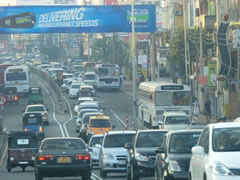
Traffic congestion in Colombo has worsened every year.
Due to high dependence on the road system, the number of vehicle registrations doubled from 2002 through 2010 in Western Province, where Colombo is located. The province has several traffic problems; for example, no efficient road systems have been developed due to the topographical constraint that the western side of the province faces the ocean, and the construction of ring roads connecting to roads radiated from the Port of Colombo has been delayed. These problems have caused heavy traffic congestion, especially during morning and evening commuting hours, resulting in a great economic loss.
Urban Transport System Friendly to People and the Environment
In this project, various types of traffic condition surveys were carried out to get an accurate understanding of the current conditions and to forecast the future traffic situation in the Colombo metropolitan region. These surveys revealed that, if no effective measures were taken, the proportion of public transportation among all other means of transportation for intercity travel would decline to 41% in 2035, compared to 58% in 2013, due to increased use of private cars, etc.
Responding to these survey results, JICA suggested in this project that the Government of Sri Lanka construct minimal road systems while insisting on the necessity of further promotion of utilizing the public transportation system to address increased future demands. In this context, JICA also recommended taking measures to regulate automobile traffic and introduce new public transportation systems, including monorail lines and a bus rapid transit system (BRT).
If the plans proposed in this project are implemented, compared to the case of no effective measures taken, not only will carbon dioxide emissions be reduced by 10% or more by 2035, but also losses due to traffic accidents are expected to decline remarkably. With policy-making assistance from JICA, the Government of Sri Lanka successfully developed transportation policies and plans that are friendly to people and the environment.
As seen in this case, JICA is making efforts to deal with the problems of cities in the world with consideration for the global environment.
Case Study
South Sudan: Comprehensive Planning and Support for Urgent Projects on Social Economic Infrastructure
Responding to the Greatest Needs for Nation-building
In South Sudan, which gained its independence in 2011, JICA is extending cooperation for social economic infrastructure development in Malakal Town (state of Upper Nile), one of the country's three major cities. Projects will make improvements in highways, rivers, water supply systems and other elements of the infrastructure.
South Sudan has succeeded in becoming an independent country. But a new nation cannot be built without progress in developing all regions of the country.
JICA aims to conduct inclusive development for the purpose of meeting the greatest needs for nation-building that are recognized by everyone in the Government of South Sudan. To perform this development, JICA in February 2012 started a project in Malakal Town, a regional city in South Sudan.
Following the peace accord, there was clearly visible progress with development programs in the capital city of Juba. Roads were paved with asphalt, water supply systems constructed and schools reopened. But Malakal Town, one of the country's three major cities, is separated both politically and geographically from Juba. Though Malakal Town was once well developed as a fortified city, it is the base of the biggest opposition political party and is 600km from Juba. Furthermore, there is no highway between this city and Juba. As a result, there has been absolutely no development in this region after independence was declared.
Providing "dividends of independence" to residents of this geopolitically important city is therefore critical with respect to assisting the residents of Malakal Town and establishing peace throughout South Sudan. The project aims to establish a comprehensive infrastructure development plan for this "forgotten city" in about six months. Then pilot projects will take place over the next 18 months to improve community roads, rivers and ports, and water supply facilities. South Sudan has a strong desire not only for infrastructure projects but also for infrastructure training programs. JICA therefore plans to assist in the revitalization of Malakal Town with three-point support consisting of infrastructure projects, training and on-the-job training.
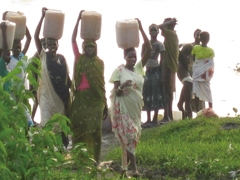
A water purification facility constructed more than 50 years ago supplies very poor quality water. Residents must use water directly from the Nile River instead. South Sudan is believed to have the lowest water supply ratios in eastern Africa.
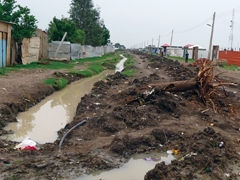
Malakal Town has almost no paved streets and the city’s so-called “black cotton soil” makes streets impassable even to four-wheel-drive vehicles and donkeys during the monsoon. This turns the city into a virtual land-locked island.
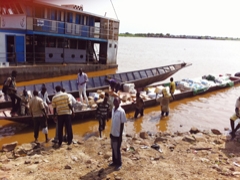
Malakal Port is used as the main harbor for the entire region. But the port’s aging facilities create difficulties for workers regarding efficiency and safety.
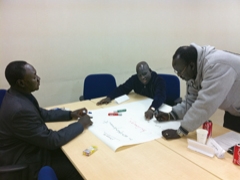
South Sudan needs training programs due to the absence of skilled people following 20 years of conflict. In December 2011, JICA invited people from the leadership class of the state of Upper Nile to talk about how to proceed with reconstruction and regional development in South Sudan and Upper Nile while learning from Japan’s own postwar reconstruction and development experience.




scroll